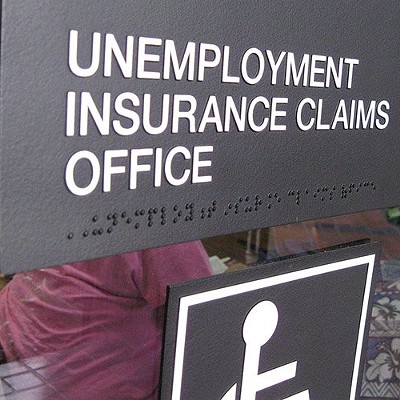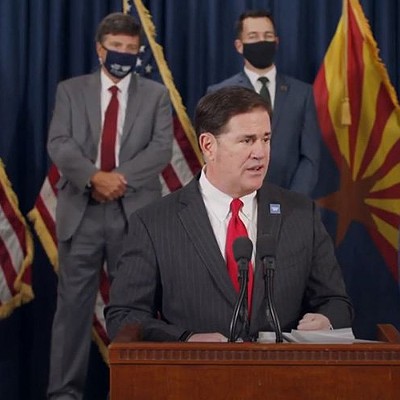But since the economy began tanking in the spring of 2001, the good times have gone bad. Lawmakers had to repeatedly patch last year's state budget--which ended the fiscal year on June 30 an estimated $25 million in the red--and were forced to bridge a roughly billion-dollar shortfall to balance this year's budget at $6.5 billion. (And it's a good bet the stitching on that one will come apart at the seams if economic woes continue.)
So it's no surprise to see each of the three Republicans running for governor in the September 10 primary taking the role of the savior who can lead Arizona back into a robust state of financial fitness.
Arizona Secretary of State Betsey Bayless, a former Maricopa County supervisor who has worked in high-level posts in state government, offers new leadership for tomorrow.
"I have the vision, the leadership skills and the experience to lead Arizona into the future," boasts Bayless, 58.
Matt Salmon, the former congressman who's widely viewed as the frontrunner in the race, says Arizona needs to turn away from the tired, failed policies of the past.
"I believe that Arizona has some serious issues to resolve right now and the same old stuff that we've been getting isn't going to cut it," says the 44-year-old Salmon. "We have to go in new directions and virtually all the people I'm running against, they've been in charge of the state for the last five or six years. They had their shot."
State Treasurer Carol Springer says we need to return to a fiscal responsibility of yesterday.
"When I was in the Senate, I worked on the state budget and we got the state in really, really good financial condition," Springer recalls. "We had $400 million in the rainy day fund, $500 million in surplus revenues. And since I became state treasurer, I have watched all of that go away. We are in the biggest financial crisis the state has ever seen."
Springer, 65, says her opponents just aren't up for the job. "I have looked at the other candidates, some of whom I know very well, and I honestly don't believe there is any candidate who is as well qualified as I am to handle these problems without huge tax increases."
Tax increases remain low on any GOP candidate's agenda. Skeptical of the current debate at the Capitol over extending sales taxes to services ranging from haircuts to legal fees, they promise instead to cut government to balance the books.
Salmon has already vowed to veto any tax increase that reaches his desk.
Born in Salt Lake City, Salmon grew up in Mesa. His Mormon mission took him abroad to Taiwan in the late '70s, where he learned to speak Mandarin. When he returned, he picked up a master's in public administration at BYU and came back to Arizona, taking a job with U S West.
Salmon jumped into politics in 1990, winning the first of two terms in the state Senate. In 1994, he won a congressional seat on the coattails of the Contract With America. In Washington, he headed up a rebellion against Newt Gingrich that led to the end of his reign as Speaker of the House after the GOP took a pounding at the polls in 1998.
At the end of his third term in 2000, Salmon stepped down, just as he promised to do when first elected. (Many of his House colleagues, who made similar noises about term limits, didn't take the rhetoric as seriously.) Returning to Arizona, he began laying the groundwork for his gubernatorial run, including tapping former VP Dan Quayle as his campaign chair.
Salmon promises to create a leaner, meaner government that delivers more while costing less. He complains the state budget has grown far faster than the rate of population growth and inflation, which he attributes to bloat in government, although he offers no solid examples of waste. He promises to freeze agency budgets and force state workers to justify any increase each year, but he says he doesn't yet know where cuts can be made.
"We're in the process of reviewing the whole budget and I think it's premature right now for me to say," he explains. "After I become governor, I intend to do a thorough review of every agency, every program and every budget to make sure that everything is absolutely essential. I'm going to tell you this: I will not tolerate another budget that's balanced with smoke and mirrors."
Salmon adds that his economic plan will bring 500,000 new jobs to the state of Arizona with a median income of $40,000 or more. "We're going to grow our way out of this," he predicts.
Bayless has her own 17-point economic blueprint to lure what she calls "wealth generators"--businesses that bring money into Arizona by exporting products elsewhere. Among the key elements in the plan: improving education, diversifying the economy and the gradual elimination of the personal property tax that businesses pay on equipment.
But rebuilding the economy is long-term solution. In the short term, Bayless cautions that government will likely have to trim some positions to balance a budget that has become loaded down with expenses resulting from initiatives such as Healthy Arizona, which extended healthcare benefits to low-income Arizonans. "Our state budget is a nightmarish work of modern political art," Bayless observes.
Bayless touts her own experience in handling state and county budgets. A year before she won the Secretary of State's office in 1998, she was appointed to the post by Jane Dee Hull, who left the office to become governor when Republican Gov. J. Fife Symington III resigned after his conviction in federal court on multiple fraud counts.
To accept the appointment, Bayless resigned from the Maricopa County Board of Supervisors, where she had served since 1989. Before entering the political arena, she had worked in state government, beginning her career as an intern in the State Personnel Department and moving up through several jobs, including stints as director of the Department of Administration and acting director of the Department of Revenue.
Bayless is the most upfront candidate when it comes to cutting costs. She's targeting what she calls an overabundance of middle managers. With state employees earning low wages, she says managers promote workers they want to retain to higher-level positions to justify pay increases, creating ranks that must now be thinned. While layoffs are possible, she hopes much of the housecleaning can be accomplished through attrition.
Springer isn't offering detailed economic mumbo-jumbo on her website, but she says her experience at straightening out the state budget in the early '90s would help her trim the fat.
A real-estate broker who represented the Prescott area in the state Senate for eight years before winning the treasurer's seat in 1998, Springer says the blame for the budget mess can be laid squarely at the feet of state lawmakers.
To hear Springer tell it, things were going just fine until she left the state Senate four years ago to win the treasurer's office. But since then, state government has exploded and lawmakers are back to the same old tricks--such as postponing some of the final bills in June to the start of the new fiscal year in July--that she helped eliminate. As result, the budget has ballooned. "It's been nothing but irresponsible money management," she complains.
But Springer is just as reluctant as Salmon to talk about where the cuts are going to come.
"You cannot address it program by program by saying do you support this or do you support that," Springer says. "What you have to look at first is a major restructuring of state government."
WHEN THEY'RE NOT addressing--or dodging--questions about cutting the budget, the candidates find common ground on many issues. None of them supports tightening gun regulation. All three support educational reform through the free market. They stress accountability and call for spending more money in the classroom and less on administration. They back charter schools and Arizona's educational tax-credits program. Both Springer and Bayless support voucher programs to allow students to private or public schools, including religious schools, while Salmon is still mulling the question.
They split most visibly on abortion rights. While Bayless and Springer are both pro-choice, Salmon says he "would like to see abortions gone except to save the life of the mother and in cases of rape or incest."
Salmon says he's doubtful Roe V. Wade will be overturned in his lifetime, but he backs laws mandating women wait 24 hours after speaking with a physician to obtain an abortion. A supporter of parental notification of minors seeking abortions, Salmon is skeptical that a statistically significant number of young women would need an alternative, such as a judge's permission, because they might be victims of sexual abuse by family members.
A fierce critic of the state's Clean Elections program, Salmon reports raising roughly $666,000 as of May 31. He reported spending nearly $325,000, leaving him with about $341,000 in the bank.
His opponents have both pursued public funding. Bayless has qualified for the Clean Elections program, giving her $409,950 to spend in the primary. (She's eligible for additional matching funds if Salmon breaks that spending threshold.)
With just two weeks until early voting begins on August 8, Springer has yet to qualify for public funding, leaving her campaign stalled at the starting gate.















